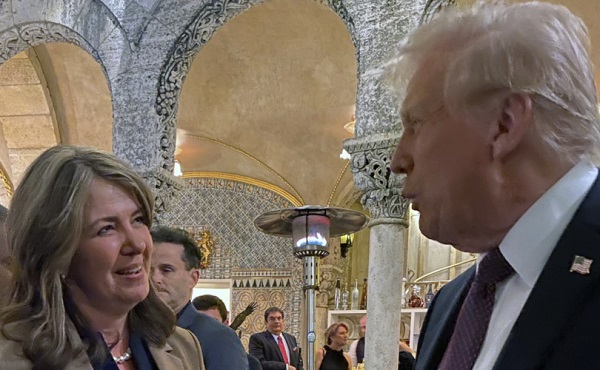Alberta
Alberta’s Danielle Smith meets with Trump at Mar-a-Lago for ‘friendly and constructive’ meeting

From LifeSiteNews
Meetings of these kinds in the past would normally have included Canada’s official ambassador, however, Smith has not waited for the Trudeau government to advocate for Canadian energy and instead has gone at it alone.
Premier of Alberta Danielle Smith met with incoming U.S. President Donald Trump at his Mar-a-Lago home to champion “ethically” sourced Albertan oil and gas only days before the president-elect is set to be inaugurated, in what she said was a “friendly and constructive” meeting.
“Over the last 24 hours I had the opportunity to meet President @realdonaldtrump at Mar-a-Lago last night and at his golf club this morning. We had a friendly and constructive conversation during which I emphasized the mutual importance of the U.S. – Canadian energy relationship, and specifically, how hundreds of thousands of American jobs are supported by energy exports from Alberta,” wrote Smith on X about her weekend meeting with Trump.
The unprecedented meeting came at the same time Trump appears to have soured relations with Canadian Liberal elites over his annexation talk.
It also comes after soon-to-be-gone Prime Minister Justin Trudeau met with Trump at Mar-a-lago last month and appeared to refuse to step up and defend the interests of Canadian energy over Trump’s threats to slap high tariffs on Canadian goods once he takes office.
Smith noted about her meeting with Trump that she was able to have “similar discussions” about championing Albertan energy “with several key allies of the incoming administration and was encouraged to hear their support for a strong energy and security relationship with Canada.”
“On behalf of Albertans, I will continue to engage in constructive dialogue and diplomacy with the incoming administration and elected federal and state officials from both parties and will do all I can to further Alberta’s and Canada’s interests,” she wrote.
Since taking office in 2015, the Trudeau government has continued to push a radical environmental agenda like the agendas being pushed by the World Economic Forum’s “Great Reset” and the United Nations’ “Sustainable Development Goals.”
Smit, on the other hand, has been a fierce opponent of Trudeau’s green energy agenda and an advocate for the oil and gas industry.
She will be attending Trump’s inauguration later next week.
Observer notes Trump made ‘beeline’ for Smith to meet her at Mar-a-Lago event
Political analyst for the Calgary Sun Rick Bell, who knows Smith and speaks with her regularly, noted about her meeting with Trump that when “Trump and his family and entourage” arrived he made “a beeline for Smith. He has obviously been told she is the premier of Alberta.”
“Smith, as you know, has recently been speaking non-stop about oil and gas and is no fan of tariffs,” Bell wrote.
Bell noted how Smith and Trump spoke about “energy, about oil and gas, about Alberta and Canada,” adding that she told him that production of Alberta oil is “ramping up in a big way and the U.S. buys a lot of Alberta oil.”
“Smith asks if Trump wants more of our oil. Trump does. It is by far Canada’s biggest export to the Americans,” wrote Bell.
Smith, in her message about her meeting with Trump, noted that Canada and the United States are both “proud and independent nations with one of the most important security alliances on earth and the largest economic partnership in history.”
She emphasized how Alberta needs to preserve its “independence while we grow this critical partnership for the benefit of Canadians and Americans for generations to come.”
Canada has the third largest oil reserves in the world, with most of it being in Alberta, which is produced ethically, unlike in other nations.
Smith’s meeting with Trump is unusual in that it has happened right before he will become president. Meetings of these kinds in the past would normally have included Canada’s official ambassador, however, Smith has not waited for the Trudeau government to advocate for Canadian energy and instead has gone at it alone.
Recently, Trump has drawn the ire of many Canadian politicians, including Conservatives, after he said rather brazenly last week that he was considering using “economic force” to make Canada the 51st U.S. state.
He claimed that there is a $200 billion trade deficit between Canada and the U.S. regarding spending on “subsidies” and the fact the U.S. military is there to also “protect Canada.”
Smith and others did not seem too offended by Trump’s remarks, most likely realizing they may be part of his negotiating strategy.
Conservative Party of Canada leader Pierre Poilievre, who likely will soon be the nation’s next prime minister, however, had choice words for Trump.
Trump’s comments came only a day after Trudeau announced he plans to step down as Liberal Party leader once a new leader has been chosen. He was approved by Governor General Mary Simon to prorogue parliament until March 24. This means he is still serving as prime minister, but all parliamentary business has been stopped.
Smith was against forced COVID jabs, her United Conservative government has in recent months banned men from competing in women’s sports came and passed a bill banning so-called “top and bottom” surgeries for minors as well as other extreme forms of transgender ideology.
Alberta
Made in Alberta! Province makes it easier to support local products with Buy Local program

Show your Alberta side. Buy Local. |
When the going gets tough, Albertans stick together. That’s why Alberta’s government is launching a new campaign to benefit hard-working Albertans.
Global uncertainty is threatening the livelihoods of hard-working Alberta farmers, ranchers, processors and their families. The ‘Buy Local’ campaign, recently launched by Alberta’s government, encourages consumers to eat, drink and buy local to show our unified support for the province’s agriculture and food industry.
The government’s ‘Buy Local’ campaign encourages consumers to buy products from Alberta’s hard-working farmers, ranchers and food processors that produce safe, nutritious food for Albertans, Canadians and the world.
“It’s time to let these hard-working Albertans know we have their back. Now, more than ever, we need to shop local and buy made-in-Alberta products. The next time you are grocery shopping or go out for dinner or a drink with your friends or family, support local to demonstrate your Alberta pride. We are pleased tariffs don’t impact the ag industry right now and will keep advocating for our ag industry.”
Alberta’s government supports consumer choice. We are providing tools to help folks easily identify Alberta- and Canadian-made foods and products. Choosing local products keeps Albertans’ hard-earned dollars in our province. Whether it is farm-fresh vegetables, potatoes, honey, craft beer, frozen food or our world-renowned beef, Alberta has an abundance of fresh foods produced right on our doorstep.
Quick facts
- This summer, Albertans can support local at more than 150 farmers’ markets across the province and meet the folks who make, bake and grow our food.
- In March 2023, the Alberta government launched the ‘Made in Alberta’ voluntary food and beverage labelling program to support local agriculture and food sectors.
- Through direct connections with processors, the program has created the momentum to continue expanding consumer awareness about the ‘Made in Alberta’ label to help shoppers quickly identify foods and beverages produced in our province.
- Made in Alberta product catalogue website
Related information
Alberta
Province to expand services provided by Alberta Sheriffs: New policing option for municipalities

Expanding municipal police service options |
Proposed amendments would help ensure Alberta’s evolving public safety needs are met while also giving municipalities more options for local policing.
As first announced with the introduction of the Public Safety Statutes Amendment Act, 2024, Alberta’s government is considering creating a new independent agency police service to assume the police-like duties currently performed by Alberta Sheriffs. If passed, Bill 49 would lay additional groundwork for the new police service.
Proposed amendments to the Police Act recognize the unique challenges faced by different communities and seek to empower local governments to adopt strategies that effectively respond to their specific safety concerns, enhancing overall public safety across the province.
If passed, Bill 49 would specify that the new agency would be a Crown corporation with an independent board of directors to oversee its day-to-day operations. The new agency would be operationally independent from the government, consistent with all police services in Alberta. Unlike the Alberta Sheriffs, officers in the new police service would be directly employed by the police service rather than by the government.
“With this bill, we are taking the necessary steps to address the unique public safety concerns in communities across Alberta. As we work towards creating an independent agency police service, we are providing an essential component of Alberta’s police framework for years to come. Our aim is for the new agency is to ensure that Albertans are safe in their communities and receive the best possible service when they need it most.”
Additional amendments would allow municipalities to select the new agency as their local police service once it becomes fully operational and the necessary standards, capacity and frameworks are in place. Alberta’s government is committed to ensuring the new agency works collaboratively with all police services to meet the province’s evolving public safety needs and improve law enforcement response times, particularly in rural communities. While the RCMP would remain the official provincial police service, municipalities would have a new option for their local policing needs.
Once established, the agency would strengthen Alberta’s existing policing model and complement the province’s current police services, which include the RCMP, Indigenous police services and municipal police. It would help fill gaps and ensure law enforcement resources are deployed efficiently across the province.
Related information
-

 2025 Federal Election1 day ago
2025 Federal Election1 day agoNeil Young + Carney / Freedom Bros
-

 Business23 hours ago
Business23 hours agoDOGE Is Ending The ‘Eternal Life’ Of Government
-

 espionage15 hours ago
espionage15 hours agoEx-NYPD Cop Jailed in Beijing’s Transnational Repatriation Plot, Canada Remains Soft Target
-

 2025 Federal Election2 days ago
2025 Federal Election2 days agoRCMP Whistleblowers Accuse Members of Mark Carney’s Inner Circle of Security Breaches and Surveillance
-

 2025 Federal Election2 days ago
2025 Federal Election2 days agoBureau Exclusive: Chinese Election Interference Network Tied to Senate Breach Investigation
-

 Autism1 day ago
Autism1 day agoRFK Jr. Exposes a Chilling New Autism Reality
-

 International1 day ago
International1 day agoUK Supreme Court rules ‘woman’ means biological female
-

 2025 Federal Election23 hours ago
2025 Federal Election23 hours agoTucker Carlson Interviews Maxime Bernier: Trump’s Tariffs, Mass Immigration, and the Oncoming Canadian Revolution








